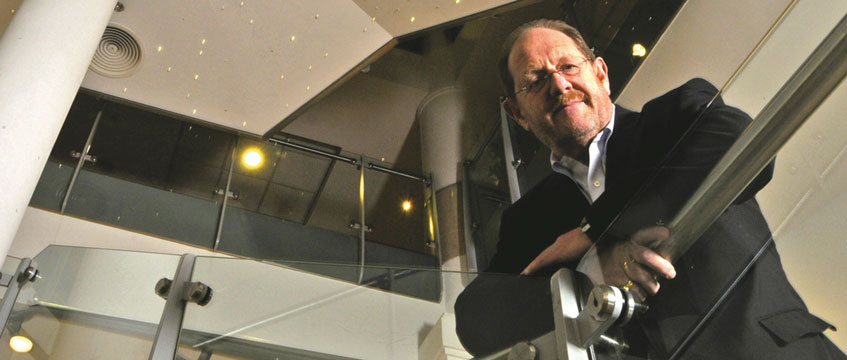Veteran hotelier Sir David Michels has worked through five recessions over the course of his career, buying and selling billions of pounds worth of hotels during the market’s ups and downs.
But even with almost 55 years of experience in leisure and hospitality, the former Hilton Group chief executive has never had to make his way through anything like the disruption caused by the Covid-19 pandemic – and he warns that the pain has only just begun.
“This isn’t the recession,” Michels tells EG on a Zoom video call from his home in Hertfordshire. “It’ll start once this ends, which I’m not quite sure most people have picked up on. This is just what it is – a worldwide infection.
“I’ve not seen anything like this before, but I’ve been through five recessions and, unfortunately, I guess I’m going to go through another.”
There is little hoteliers can do now except pray, cut operating costs to a minimum and “be nice to your bank”, Michels says. But despite this, Michels, who was knighted in 2006 for his work in hotels and catering and today chairs hotel management and advisory firm Michels & Taylor, has faith that the sector will survive.
Having withstood the test of time – as recorded from the “outbooking of Joseph and Mary at the inn” – Michels says hotels are here to stay, even if it remains unclear what form they will take and on what terms.
A travel boom awaits
Cities have suffered from the lack of demand for overseas travel, business trips, meetings and events. Occupancy at London’s hotels has shrunk to less than a third this year, according to research from PwC, down from some 83% in 2019. Revenue per available room has sunk to £28.72 from £128.70 in 2019.
But Michels is certain that reduced demand in major cities such as London will be temporary. He says the “best-located” hotels will bounce back the quickest, since the pandemic will not have changed customers’ requirements. “When Hilton said the three most important things about hotels are location, location, location, it was right,” he adds.
“My personal view is that in five years’ time no one will be thinking about the epidemic and everyone will be crowding into London, Paris, New York, Rome, Tokyo, just as they did before. They’re not going to be scared of the epidemic anymore, by definition. And what do you do in Watford on a Saturday night?”
I’ve not seen anything like this before, but I’ve been through five recessions and, unfortunately, I guess I’m going to go through another
– Sir David Michels
While occupancy in upscale hotels appeared to stay resilient between national lockdowns, particularly on the coast and in the country, Michels warns that the industry should not expect this to continue indefinitely. “The luxury hotels did wonderfully and upped [their] prices – you couldn’t get in,” says the former London & Capital chairman. “These are the people who couldn’t travel to Marbella, couldn’t go to the south of France, couldn’t go shopping in New York. They all piled into luxury hotels in the UK. Lovely, but a false market. It won’t reoccur.”
But he predicts that the rebound of the hotel business in the medium term will be driven by an “enormous pent-up demand” to travel after the crisis.
“The number of people who travel has grown to a new peak after every recession,” says Michels, who also counts a period as deputy chairman at easyJet among a plethora of high-profile, past board roles.
“There are new countries, new births and new people who just want to see the Eiffel Tower – it’s as simple as that,” he says, adding: “There’s no shortage of potential customers. Some of them will have second homes, choose Airbnb or stay with [family]… But the resurgence of new travellers more than makes up for alternative accommodation uses. The market will continue to grow. But the journey to that growth is probably three or four years.”
Changing hands
Michels is sceptical of the “talk in the steamie” that some 20% of the world’s underperforming hotels might disappear after the crisis, given how expensive demolition and repurposing would be for property owners. Yes, he acknowledges, many properties will find themselves under new ownership, but to see swathes of buildings boarded up is less likely.
“In every other recession hotels have not shut, they just have different owners,” he says. “Even after the product’s gone bankrupt – 10 times in some cases – the actual [hotel] remains, just with different management and different sets of backers. Most hotels with over 100 bedrooms fit into that.”
But there remains the present day’s challenges to contend with. Michels says that lenders, “even the very smart ones”, are not yet clear on their next steps. He predicts the coming six-to-eight weeks will be a crunch period for decisions on which hotels remain under existing ownership, which are repossessed and which are put up for sale.
Given that valuations are up in the air – most hotels are still valued at a multiple of net profit – all signs point to a lull before the storm. Michels says: “At the moment, as far as I can tell, the banks are not doing anything in the UK, and almost certainly in Europe too. Either because [they’re] just sensible – how can they value something that isn’t open? – because they don’t want to hurt anyone before Christmas, or because they’re stuck in the headlights like the rest of us.
“And if they suddenly get ownership of a hotel, like the thousands they did in the [1980s] recession and the ‘93 recession, what are they going to do with them?
“But at some point, the banks and lenders are going to have to make a decision. And the race to the finishing line is [based on], will this re-open before the money runs out? It’ll be different for every company, but the principles will be the same for everyone, however small [or] big.”
Competition to catch the attention of cash-rich funds or potential acquirers that have amassed dry powder will also intensify.
“Everybody says there is a ‘wall of money’ waiting to invest,” says Michels. “The American venture capitalists, the big funds – there’s a lot of cash about, but there will be an awful lot of industries and assets for that wall of money to invest in. So I don’t think it’s as easy as putting a 100-bedroom hotel in Lyon up for sale and [expecting] everybody to over-bid for it. It ain’t going to happen.
“No one’s clear how much money one is going to make or when they’re going to make it. The general consensus is that by 2024, business will be back to usual. But that’s three years of trading.”
Adapting to change
As the near term looks set to get tougher for the sector, Michels’ firm has extended its own offering to prepare for what lies ahead. The firm has created a mezzanine fund that will offer loans ranging from £5m to £50m, along with scope for senior debt, to support hotels facing issues with liquidity. It is aimed at businesses in the UK and continental Europe, on two- to five-year terms.
The hotelier is keen to stress that it is designed to support businesses that were strong before the crisis, rather than swoop on distressed assets.
“With M&T, we’re trying to cover all fronts at the moment,” he adds. “Indeed, we too are lucky that we’ve survived, because obviously our income has gone down massively. We will survive. But it hurts.”
Michels personally owns stakes in five hotels, including one at Manchester Airport, where demand has suffered. But he has no regrets. “In the end, they will come good,” he says. “You need a lot of patience and a fair bit of cash in the bank to keep them going. It is, like all business, risky to invest in – it’s extraordinarily long term. But I love the business.”
As the pandemic continues to take its toll on the industry, Michels hopes the industry will keep faith in its merits, just as he has done. “I’d just like to wish everybody good luck,” he says. “It will clear up in the end – it’s just the end might be a little while.”
To send feedback, e-mail pui-guan.man@egi.co.uk or tweet @PuiGuanM or @estatesgazette











